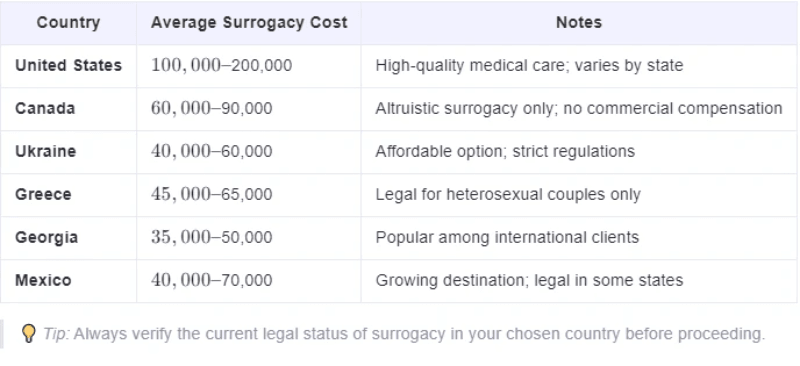Surrogacy is a life-changing process that offers hope to individuals and couples who are unable to conceive or carry a pregnancy naturally. As more people turn to surrogacy as a path to parenthood, understanding the surrogate mom cost becomes crucial. Whether you're considering surrogacy in the United States, Canada, Ukraine, or any other country where it's legally permitted, knowing what goes into the overall expense can help you make informed decisions.
In this comprehensive guide, we’ll explore:
- What surrogacy entails
- The different types of surrogacy
- A detailed breakdown of surrogate mom costs
- How costs vary by location
- Ways to manage or reduce expenses
- Frequently asked questions
Let’s dive in.
What Is Surrogacy?
Surrogacy is an arrangement in which a woman (the surrogate) agrees to carry and give birth to a child for another person or couple (the intended parents). There are two main types of surrogacy:
- Traditional Surrogacy: The surrogate is artificially inseminated with the sperm of the intended father or a donor. In this case, the surrogate is genetically related to the child.
- Gestational Surrogacy: The most common form today, where the embryo—created via IVF using the egg of the intended mother or a donor—is implanted into the surrogate’s uterus. The surrogate has no genetic link to the baby.
Due to legal and emotional complexities, gestational surrogacy is now the preferred method in most countries.

Understanding the surrogate mom cost is essential for several reasons:
- It helps intended parents budget effectively.
- It allows for comparison between agencies, clinics, and countries.
- It prevents unexpected financial burdens during the process.
The total cost of surrogacy can range from 70,000 toover 200,000, depending on various factors such as location, legal fees, medical procedures, and whether insurance or additional services are involved.
Breakdown of Surrogate Mom Cost Components
Here’s a detailed look at the typical components that contribute to the overall surrogate mom cost:
1. Surrogate Compensation
This is the fee paid directly to the surrogate for her time, effort, and commitment. In the U.S., compensation typically ranges from 30,000 to 60,000, though it may be higher if she has previous successful surrogacy experiences or needs to travel frequently for appointments.
Note: Some states have laws governing how much surrogates can be compensated, while others leave it up to negotiation.
2. Medical Expenses
These include costs associated with fertility treatments, prenatal care, delivery, and postnatal follow-up. Depending on the clinic and complexity of the case, medical expenses can range from 25,000 to 80,000.
Key components:
- IVF cycles
- Embryo transfer
- Prenatal vitamins and medications
- Ultrasounds and lab work
- Hospital delivery costs
3. Legal Fees
Surrogacy involves complex legal contracts to protect all parties involved. Legal fees generally fall between 4,000 and 10,000, depending on the jurisdiction and whether multiple attorneys are required (one for the intended parents and one for the surrogate).
4. Agency Fees (If Applicable)
Many intended parents use surrogacy agencies to match with surrogates, coordinate logistics, and provide support throughout the journey. Agency fees can range from 15,000 to 30,000, depending on the level of service provided.
5. Insurance Coverage
Health insurance for the surrogate is a critical component. If the surrogate does not already have adequate coverage, intended parents must purchase a policy that covers maternity-related expenses. This can cost between 10,000 and 30,000.
6. Miscellaneous Expenses
- These include:
- Travel and lodging for the surrogate
- Maternity clothing allowance
- Lost wages (if the surrogate must take time off work)
- Psychological counseling for both parties
These can add another 5,000 to 10,000 to the total cost.

Surrogacy laws and costs vary widely across the globe. Here’s a snapshot of surrogate mom costs in popular surrogacy-friendly destinations:

Factors That Influence Surrogate Mom Cost
Several variables can affect the final price tag of surrogacy:
- Geographic Location: Costs are significantly higher in the U.S. than in Eastern Europe.
- Multiple Births: Twins or triplets increase medical and surrogate compensation costs.
- IVF Success Rate: Couples may require multiple embryo transfers, increasing costs.
- Legal Complexity: International surrogacy often involves additional legal steps.
- Surrogate Health: Pre-existing conditions or complications during pregnancy can lead to higher medical bills.
Managing Surrogate Mom Costs: Tips & Strategies
While surrogacy is undeniably expensive, there are ways to manage or reduce the surrogate mom cost without compromising safety or quality:
1. Choose the Right Agency
Some agencies offer transparent pricing models. Compare services and avoid hidden fees.
2. Consider Domestic vs. International Surrogacy
While international surrogacy is cheaper, factor in travel, legal translation, and potential risks.
3. Use Frozen Embryos
Fresh IVF cycles are more expensive. Using previously frozen embryos can save thousands.
4. Opt for Shared Agencies or Support Groups
Some organizations connect intended parents directly with surrogates, cutting out the middleman.
5. Explore Financing Options
Many fertility clinics and agencies offer payment plans or financing options.
6. Look Into Insurance Plans
Work with specialists who can help you find affordable maternity insurance for the surrogate.
Real Stories: Intended Parents Share Their Experiences
Hearing from those who’ve gone through surrogacy can provide valuable insight into the surrogate mom cost and emotional journey.
“We spent around $120,000 on our surrogacy journey in California. While it was expensive, seeing our daughter made every penny worth it.”
— Sarah & David, USA
“We chose Ukraine and saved nearly $70,000 compared to what we would’ve paid in the UK. We worked with a reputable agency and had a smooth experience.”
— Maria & Alex, UK
These stories highlight the diversity of experiences and underscore the importance of planning ahead financially and emotionally.

Ethical Considerations in Surrogacy
While the surrogate mom cost is a practical concern, ethical considerations should never be overlooked. Surrogates should always be treated with respect, fully informed about the process, and fairly compensated—not exploited. Transparency, legal clarity, and emotional support are vital for a positive outcome for everyone involved.
Frequently Asked Questions (FAQ)
Q: Can I choose my surrogate?
A: Yes, many agencies allow intended parents to review profiles and select a surrogate based on shared values, lifestyle, and preferences.
Q: Is surrogacy legal everywhere?
A: No. Laws vary by country and even within regions. Always consult with a qualified attorney.
Q: Do surrogates get paid monthly?
A: Typically, surrogates receive a base fee paid in installments throughout the pregnancy, plus allowances for expenses like food and travel.
Q: What happens if the surrogate wants to keep the baby?
A: In gestational surrogacy, the surrogate has no biological connection to the child. Legal contracts prevent this scenario, but laws differ by jurisdiction.
Q: Are surrogacy payments tax-deductible?
A: In some countries, yes. Consult a tax professional for guidance specific to your situation.

Conclusion: Understanding Surrogate Mom Cost Is Key to Your Journey
Embarking on a surrogacy journey is both exciting and complex. By understanding the surrogate mom cost upfront, you can better prepare yourself financially, emotionally, and logistically. Whether you choose to pursue surrogacy domestically or internationally, thorough research, careful planning, and working with trusted professionals will pave the way for a successful experience.
Remember, surrogacy is not just about the money—it’s about building a family, honoring the surrogate’s sacrifice, and creating a future filled with love and joy.
